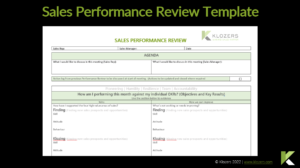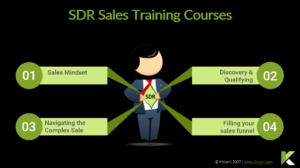

Sales Coaching – For Individuals and Sales Teams
There’s a new way to deliver sales growth…
Don’t buy Sales Training until you’ve watched this video…
1. Sales Coaching - Why Invest in Coaching?
At Klozers we love sales coaching. Watching people or a company who had previously struggled, suddenly find their feet and take off, is one of the main benefits of our job.
However, as with anything in business, sales coaching must provide real value and a financial benefit to the business. Unfortunately, many companies still do not invest in professional coaching for their salespeople and the most common reason for this is the cost.
One could argue that if you can’t afford sales coaching then there is an even greater need for it. Perhaps it’s easier for people to blame the cost, than for the coaching profession to admit they could do more to help justify the costs.
We were in that position ourselves until we changed the format of our own sales coaching in order to make it easier for our clients to measure the increases in their pipeline and the subsequent sales revenue that comes from this. If you would like to learn more about this and how you can change your own sales coaching process then you can jump to the end here.
2. Sales Training vs Sales Coaching - what's the difference?
Many people get confused between what is sales training and what is sales coaching. Not only is training and coaching different, they also have different outputs which are really important.
Whereby sales training is about the transfer of knowledge, Sales Coaching is about the practical implementation of that knowledge in the field.
The easiest way to think of this is if your company has technical people like engineers or software developers. The training is what a developer would go through to learn how to write the code.
The coaching is what the developer would need to turn the code into a meaningful application for your business. This means that coaching is the part that drives productivity in the sales team.
One of the main benefits of coaching is that it reinforces the new skills and techniques learnt during the training. Without coaching studies show that up to 98% of knowledge is lost within 30 days.
In other words, one off event-based training sessions have a very limited impact on sales productivity.
3. When to coach and when not to coach
A recent study on Sales Coaching identified it as one of the most productive activities for any sales team, however, not every sales rep is coachable. Some salespeople have a “superiority complex” and don’t believe they can either learn or improve.
This can be falsely reinforced by hitting sales targets that are too low or by being the top sales performer in a group. Other people will not responding to coaching as improving sales invariably means changing sales behaviours and every human being struggles to change their behaviours.
The last reason some salespeople do not respond to coaching is because they are simply stuck in their own comfort zone, and without any really powerful reason to change they simply carry on as before.
The irony is of course that in the majority of cases these people are in the most need of training and coaching. With that said, unless there are exceptional circumstances you should not invest time or money in coaching people who have no desire to improve.
You must either accept them as they are and the potential negative impact they will have on the wider group, or you must have one of those ”management” conversations with them.
Get started with our Sales Performance Coaching
4. Sales Coaching Models
There are many sales coaching models and frameworks that you can choose from. The one we use both internally and externally is the GROW model which we find provides the simplicity and flexibility we require.
It’s worth noting that coaching in sales can be very different to other forms of coaching. For example, in Exec coaching, coaches are encouraged not to provide the answers and to focus on the questions.
This forces the coachee to come up with the answer and the though process is that because its their idea they are more likely to believe it and then act on it.
In sales when there are potentially millions of dollars in terms of deal values up for grabs and time is of the essence, the best sales coaches will switch from a consultative coaching process to directive coaching whereby they are training, coaching and advising the coachee what they need to do.
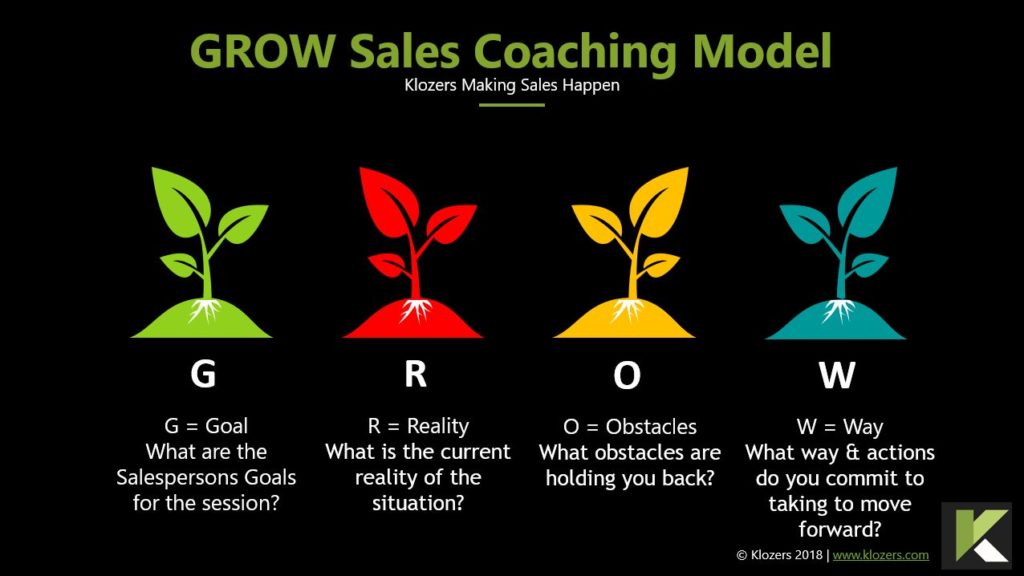
Opportunities for Coaching
There are many areas within sales that lend themselves to sales coaching. The most common areas Managers should be focussing on for coaching we have found are around:
Sales Activity
Accountability
Lead Generation
Pipeline Coaching
Qualifying/disqualifying
Deal Coaching
Field Coaching
Pre-call planning
Post-call debriefing
Storytelling
5. The Six Biggest Benefits of Sales Coaching
1. Growing Sales Revenues
The more adept your employees become at selling, the more revenue they will generate for your business. We use the word employees because sales has changed and the most productive companies have people in every department that can sell to one degree or another.
For example, many companies who have now aligned their sales and marketing now acknowledge that great salespeople can do marketing and great marketers can sell.
Best in class companies have expanded this to their operations team who are now positioned as thought leaders and subject matter experts. This helps build brand authority and helps to differentiate companies in the marketplace.
By investing in training based on the very latest strategies, techniques and market activity, you can gain a real edge over your competitors.
2. Increased Sales Productivity
Productivity can be difficult to measure in many roles, however, in sales there is a tangible figure every month that can be used as a good indicator.
That’s not to say that your MRR (Monthly Recurring Revenue) or other revenue goals are the only indicator of productivity, but it’s always the ultimate figure that sales reps are judged by.
Whereby sales training is about the transfer of knowledge, Sales Coaching is about the practical implementation of that knowledge in the field. This means that coaching is the part that drives productivity in the sales team.
With studies showing that 83% of employees want to learn new skills sales training and coaching can make your team more productive and efficient. Quality sales coaching sessions can inspire your team and help them get out of a rut.
You may find that some of your employees feel that they know all there is to know about driving sales. However, the market is always changing, and what works one year isn’t always as effective 12 months later.
Some of your employees may have more sales potential than they think, and training and coaching can help them unlock this.
3. Closing Bigger & Better Deals
Many times human beings create their own glass ceilings and get stuck. Salespeople are susceptible to this and often suffer from self limiting beliefs around deal sizes, sales behaviours and the whole sales process.
Sales training can give your staff the skills they need to secure bigger, more lucrative deals, however without coaching they will quickly lose the new skills and revert back to type.
A good sales coach helps embed the new skills and strategies your sales reps learn in training and helps hold them accountable to using the new skills. As your team become more knowledgeable and confident, they’re more likely to close more deals and bigger ones.
By using highly experienced sales coaches who live and breathe sales you are in effect fast tracking your team past all the typical problems they will encounter that slow down company growth.
Your team will learn about the latest best practices that they can follow whilst attempting to close deals. The more successful your sales reps become, the more their confidence will grow. Success breeds success.
4. Win More New Clients
Often the most difficult activity in sales is generating new business. Sales prospecting, lead generation, whatever you call it in your business filling the top of your sales funnel is always a challenge in B2B sales.
The problem with prospecting is that nobody wants to do it, but it still needs to be done. Many of the problems associated with sales prospecting are connected to the mindset of the sales reps.
It’s easy to churn out 70 calls a day, and even when you achieve some success it’s difficult to get motivated to come back in day after day and make more calls.
The job of the modern sales coach isn’t just to help improve your telephone skills, or the number of dials you make every day. A great sales coach will take a more strategic approach, and work with you on the bigger picture – revenue goals, sales coals, sales campaigns that dramatically increase your sales results.
This in turn helps to motivate and inspire your staff, and get them thinking more strategically about the sales process.
5. Boost Workplace Morale
Great sales coaching can also boost confidence and improve morale amongst your staff. Research by LinkedIn shows that 91% of people agree that teams that learn new skills together are more successful.
Furthermore 90% of people surveyed believe that team learning helps foster a sense of belonging to the organisation.
Whilst not everyone will, the majority of your team members are likely to appreciate the effort you’ve put into training them, and helping them improve their knowledge and skills.
Investing in training shows your staff that you care about their career development and want them to achieve more. If staff feel valued, they are more likely to meet their goals and stay with the organisation longer.
Employee satisfaction can be worth its weight is key when it achieving customer satisfaction and meeting business targets. Training can also refresh their knowledge so they can follow and new best practices and anything they may have forgotten or become unclear about.
6. Increased Decision Making by Sales Reps
Many companies struggle to grow because there are bottlenecks in their internal decision-making process. These bottlenecks occur when sales reps do not have the confidence or knowledge to make any form of decision.
This makes companies less agile and slow to react to changes in the market. Many companies are investing in sales training and coaching in order to improve the decision-making skills of their sales leadership team.
Effective sales coaching can help your team recognise and capitalise on opportunities to drive not only your business forward, but their professional development too.
Sales trainers act as a sounding board and can listen to your Teams ideas and help them fine-tune them to make them more effective in real-world situations.
Other benefits of sales coaching are that your team can become more creative and you will foster an environment where they feel more comfortable discussing new ideas.
6. Virtual or Remote Sales Coaching
During the lockdowns of 2020 and 2021 many salespeople were forced to work from home. Homeworking was easier for some than others, however, many studies showed that people felt less connected and even unsettled when working from home.
Many Field Salespeople who had spent their lives on out on the road where suddenly confined to their home and confronted with a completely new way of selling. These are exactly the sort of scenarios where coaching can help people adjust to new circumstances and maintain performance.
In many cases sales reps had to retrain on how to sell remotely using tools like MS Teams and Zoom. Sales training and coaching can bring your remote team together and make it more than the sum of its parts.
The best sales trainers don’t just focus on boosting individual performance but foster a sense of teamwork and unity between your staff. To close big deals in the modern sales world takes a Team and not just one individual.
If everyone is using a common sales language and are working together at the best of their abilities, you’re more likely to close bigger and better deals than ever before.
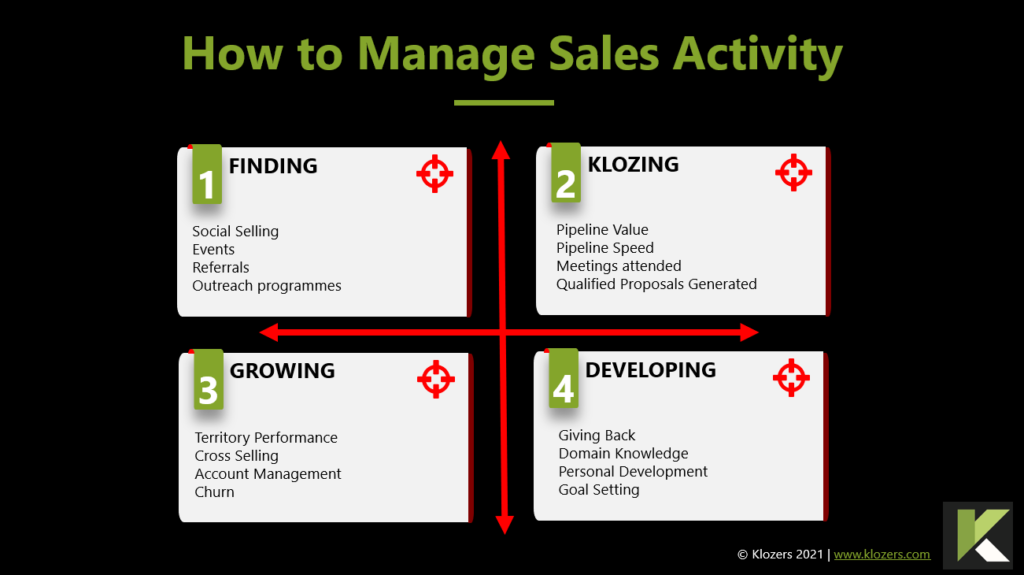
7. Sales Coaching Tips
1. Focus on One-on-One Coaching
One of the most impactful sales coaching tips is to prioritize one-on-one coaching sessions. Sales representatives often struggle with specific challenges unique to their roles. By tailoring these sessions to the individual’s needs, a sales coach can offer the most relevant content and actionable advice. This personalized approach enables sales reps to make progress more effectively, ultimately achieving their business goals and hitting quotas.
2. Implement an Effective Coaching Program
An effective coaching program is essential for any sales organization looking to improve its sales performance. By regularly conducting coaching sessions on a monthly basis, sales managers can keep their teams on track. The best coaching programs include a formal process for providing ongoing feedback, focusing on areas for improvement, and setting clear objectives. Implementing such a program can significantly impact your team’s effectiveness and overall success.
3. Encourage Role Play and Real-Life Scenarios
Role play is a crucial component of sales coaching that allows salespeople to practice real-life scenarios in a safe environment. This technique not only prepares them for potential sales situations but also helps them to refine their selling techniques and overcome common obstacles. By simulating conversations with prospects, sales reps can better articulate their value propositions, handle objections, and close deals more effectively.
4. Offer Constructive Criticism and Praise
Balancing constructive criticism with praise is vital in sales coaching. While it’s important to address areas where sales reps need to improve, recognizing their strengths and achievements is equally crucial. Offering encouragement and celebrating small wins can boost self-motivation and foster a positive coaching environment. Remember, the goal is to create an environment where salespeople feel supported and motivated to excel.
5. Align Coaching with Business Goals
To ensure your sales coaching efforts lead to tangible results, it’s important to align your coaching activities with your organization’s business goals. Regularly reviewing progress toward quotas, discussing action plans, and adjusting strategies as needed will help keep your team focused on what matters most. By aligning coaching with business objectives, you can create a win-win scenario where both individual reps and the organization as a whole achieve success.
6. Utilize Technology for Continuous Improvement
Leveraging technology like CRM systems and sales analytics tools can enhance the effectiveness of your coaching program. These tools provide valuable insights into sales performance, helping coaches identify areas for improvement and track progress over time. Additionally, video recordings of sales calls can be reviewed during coaching sessions to offer specific, actionable feedback. Incorporating technology into your coaching process not only improves efficiency but also ensures that your coaching remains data-driven and impactful.
7. Foster a Culture of Continuous Learning
Sales coaching should be viewed as an ongoing process rather than a one-time event. Encouraging a culture of continuous learning within your sales organization is key to long-term success. Provide your team with professional development opportunities, such as sales training courses or workshops, to help them grow their skills. A great coach knows that developing people is a continuous journey, one that requires commitment, support, and the right resources.
8. Best Practices for Sales Managers in Coaching Sessions
When it comes to improving the performance of sales representatives, the role of a sales manager in coaching sessions is crucial. Conducting effective coaching sessions requires a structured approach that leverages insights, encourages motivation, and focuses on the specific needs of each team member. Below are some best practices that sales management can follow to ensure their coaching sessions get the best results:
1. Understand Your Team’s Needs:
Sales managers should begin by identifying the unique strengths and weaknesses of each sales representative. By conducting a thorough analysis and reflecting on past performance, managers can tailor coaching sessions to address the specific challenges that sales reps struggle with, ensuring that each session is impactful.
2. Set Clear Objectives:
Establishing clear, actionable goals is essential for any coaching session. Sales managers should define what success looks like and communicate these objectives effectively to their team. Whether it’s improving close rates, enhancing product knowledge, or mastering objection handling, having a defined goal helps in tracking progress and ensuring accountability.
3. Incorporate Regular Feedback:
Consistent feedback is a key component of successful coaching. Sales managers should provide constructive criticism while also recognizing the achievements of their sales reps. Regular feedback, given during weekly one-on-ones or after team meetings, helps reinforce positive behaviors and correct any areas of concern.
4. Utilize Role-Playing Scenarios:
Role-playing is an excellent way for sales representatives to practice and refine their skills. Sales managers should incorporate role-playing exercises into their coaching sessions to simulate real-world scenarios. This approach not only builds confidence but also helps reps think on their feet and improve their performance during actual sales calls.
5. Foster an Open Communication Environment:
Creating an environment where sales reps feel comfortable discussing their challenges and successes is vital. Sales managers should encourage open-ended questions and active participation during coaching sessions. This open communication fosters trust and allows for a more personalized coaching experience.
6. Leverage Data and Technology:
Sales managers can enhance the effectiveness of their coaching sessions by leveraging data-driven insights from CRM systems and other sales tools. Analyzing sales performance data helps in identifying patterns, tracking progress, and making informed decisions. Additionally, using video recordings of sales calls can be a powerful way to provide targeted feedback.
7. Focus on Long-Term Development:
While addressing immediate performance issues is important, sales managers should also focus on the long-term development of their team members. This includes providing professional development opportunities, offering career guidance, and helping reps build a path toward achieving their career goals.
8. Balance Between Guidance and Autonomy:
A great sales manager knows when to provide guidance and when to allow reps to take ownership of their learning. Striking the right balance between offering direction and encouraging autonomy empowers sales reps to take initiative and develop their problem-solving skills.
9. Track and Measure Progress:
Regularly tracking and measuring the effectiveness of coaching sessions is critical. Sales managers should set key performance indicators (KPIs) and use these metrics to evaluate progress over time. This approach ensures that the coaching process is aligned with the overall sales goals of the organization.
By implementing these sales coaching activities, sales managers can conduct coaching sessions that not only improve individual performance but also contribute to the overall success of the sales organization. Effective coaching sessions are a blend of insight, motivation, and structured guidance, and when done right, they have the power to transform average companies into high-performing sales teams.
9. Sales Coaching Techniques
Sales coaching is a critical part of any effective coaching program, especially in a dynamic sales organization where sales representatives are constantly adapting to new challenges. Here are some essential sales coaching techniques to help your sales reps succeed:
1. One-on-One Coaching for Personalized Development
Personal 121 coaching sessions are an effective way to address the unique needs of individual sales representatives. Often a Sales rep may struggle with specific obstacles in their role, and these tailored sessions allow coaches to provide relevant content and actionable advice. By making personal coaching a top priority, sales coaches can focus on developing core performers, thereby improving overall sales performance and achieving business goals.
2. Implementing an Effective Coaching Program
A structured and effective sales coaching program is essential for ongoing development and quota attainment. According to CSO Insights, a well-implemented coaching process leads to significant improvement in close rates and overall sales performance. By scheduling coaching sessions on a monthly basis and providing ongoing feedback, managers can ensure their teams are consistently making progress. Importantly, these sessions should be seen as opportunities for constructive criticism and praise, helping to motivate and guide reps toward success.
3. Role Play to Prepare for Real-World Scenarios
Of all the sales coaching activities you could implement, Role play is by far the most productive. Role play is a proven technique that prepares salespeople for real-world interactions with prospects. By practicing different approaches in a controlled environment, the sales rep can build confidence and refine their techniques. This method not only helps reps articulate value propositions more effectively but also enables them to overcome common objections they may face during sales calls.
4. Leveraging Technology for Enhanced Coaching
The use of CRM systems and other sales enablement tools is crucial in modern sales coaching. These technologies provide valuable insights into sales activities, allowing coaches to track performance, identify areas for improvement, and review sales calls for feedback. By integrating technology into your coaching sessions, you can ensure that your coaching is data-driven and tailored to the specific needs of your sales team.
5. Encouraging a Culture of Continuous Learning
Creating an environment that fosters continuous learning is vital for long-term success. Sales coaching should not be a one-time event but rather an ongoing process that aligns with the organization’s goals. By offering professional development opportunities and encouraging self-motivation, sales leaders can ensure that their teams are consistently developing and improving. This culture of continuous learning will ultimately lead to greater job satisfaction and higher retention rates.
6. Aligning Coaching with Business Goals
To maximize the impact of sales coaching, it’s crucial to align coaching activities with the organization’s business objectives. Regularly reviewing progress and setting action plans based on these goals helps create a win-win situation where both the sales reps and the organization achieve their targets. By focusing on these main points during coaching sessions, sales leaders can ensure that their teams are on track to hit their quotas.
7. Fostering Trust and Ownership Among Reps
Effective sales coaching is built on a foundation of trust and ownership. Sales coaches must foster an environment where reps feel supported and accountable for their progress. By involving reps in the decision-making process and encouraging them to take ownership of their development, coaches can empower them to achieve success. This approach not only leads to better results but also helps build stronger, more resilient sales teams.
By implementing these sales coaching techniques, you can create an effective and motivating environment that drives your sales team toward success.

10. Coaching your Sales Team in a Structured Way
It’s common for companies to know exactly what kind of training their teams need. However, many sales management teams are unclear about how the training should be structured.
Structure is important because it ensures that the training sticks and is embedded in the organisation. Without any form of structure you will find participants forget up to 98% of what they learn in training.
Experienced training providers and coaches can help you examine your current sales culture and build a training programme that’s specifically tailored to your organisations needs.
A sales training provider can carry out research such as a training needs analysis before training and coaching takes place. Any training and coaching should also be aligned with the companies sales strategy.
For example, if there is a need from the business to reduce customer churn the training and coaching on this topic might be a priority.
Training can also be built around new product launches and sales campaigns and wherever possible should be built around your current sales challenges.
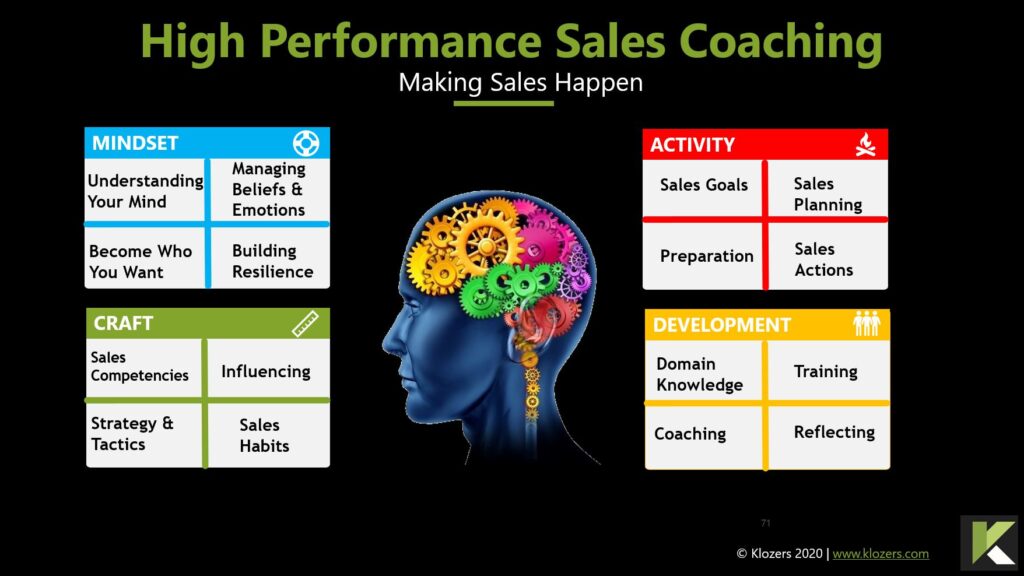
11. Product and Service Training
Buyers have very little time to spend with sales reps and when they do they want to talk to salespeople who understand their industry, their business and their own products and services.
For any new sales rep this can be a huge challenge as they get up to speed on products and services.
Buyers expect salespeople to know all the answers to their questions, and their products inside out. including all their features and benefits. While training supports features and benefits, coaching provides the all important bridge between them, and what relevance and value they provide to the customer.
Sales coaches can help reps gain a deeper, richer understanding of the context and relevance of the products that they’re selling. This in turn allows them to emphasise their value when discussing them with customers.
A quality sales coach will encourage your team members to talk about the most important features of your solutions, so your prospects can clearly see how beneficial they are, resulting in more sales success for everyone.
12. Coaching Sales Managers
Many companies overlook one of the most important elements of any successful sales coaching program, namely the sales manager.
In most cases a sales manager also fulfils the role of the sales coach and as such has a huge influence on the success of the sales team.
Coaching sales people will have limited results if the overall coaching program does not include the sales manager.
Modern sales managers set the bar in terms of productivity and sales performance, so unless they are learning and improving, neither will their team be.
Most sales managers have neither been trained in sales management, let alone as a sales coach.
Running an effective sales coaching programme is very different from being a great sales person or sales manager.
13. Virtual Selling
The pandemic and subsequent lockdowns resulted in many traditional field sales reps being taken off the road and working from home.
Despite most lockdowns having lifted the traditional field sales role has in some cases merged into a hybrid role and in other cases been removed completely.
Virtual selling is here to stay and for most organisations this represented an immediate need for sales coaching and training to support reps in their changed environments.
Sales Managers with no training as sales coaches where thrown into the limelight, and overnight were required to be the sales coach.
In addition to their management duties, overnight they now had strategic coaching, tactical coaching, sales cycle coaching team motivation, coaching sales calls, coaching underperforming sales reps, one on one meetings, group sessions to keep their team motivated, boost engagement maintain accountability and sales performance.
All this whilst managing their own performance and continuing to meet the revenue and sales goals and overall sales success of the organisation. Sales managers need support, they need professional development programs themselves if they are in turn expected to support other team members.
Remote selling requires a different skill set and different coaching techniques in order to deliver results.
14. In Conclusion
If you’re interested in providing structured and effective sales coaching program that’s specifically based on your needs, we would love to talk with you. Sales coaching can reverse any negative sales trends, make your team more adept at selling, improve your sales processes and increase morale within your workforce.
By getting your sales leaders on board and involved in the training and coaching process, you can increase the chances of the training being successful.
Sales coaching can also unite sales teams, help you close bigger, better and more lucrative deals, enhance your revenue, help you win new clients, and retain existing ones. Few companies regret their decision to invest in sales coaching.
Klozers has different sales coaching programs available for salespeople, sales managers and business leaders. We have built our business on our ability to train and coach sales professionals across various industries and love what we do.
Share this page

Author Bio
Iain Swanston has spent over 30 years in B2B sales selling, training and leading teams both domestically and internationally. In addition he serves as an Associate at Strathclyde University Business School where he has delivered the sales content for the Masters in Entrepreneurship since 2015.
Related Posts
124 City Road,
London,
EC1V 2NX.
8911 North Capital of Texas Highway, Suite 4200 #1154
Austin, TX 78759
United States
Klozers
Ground Floor
470 St Kilda Road
Melbourne VIC
3004




